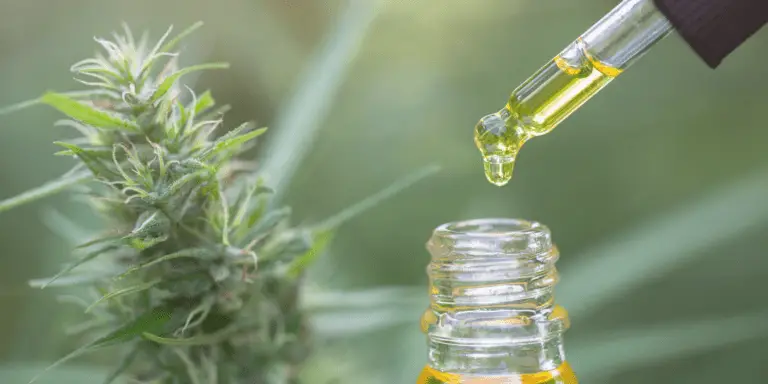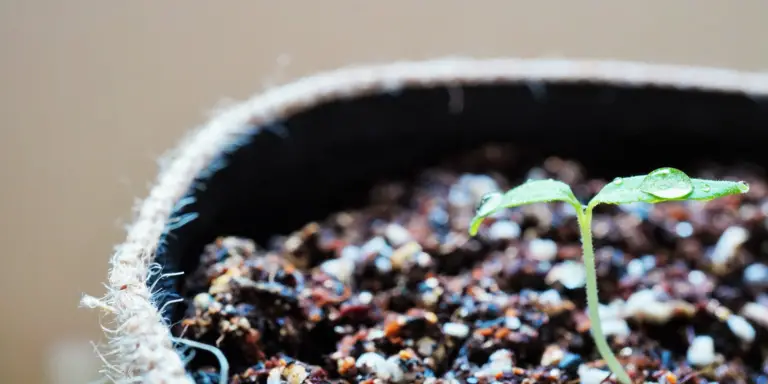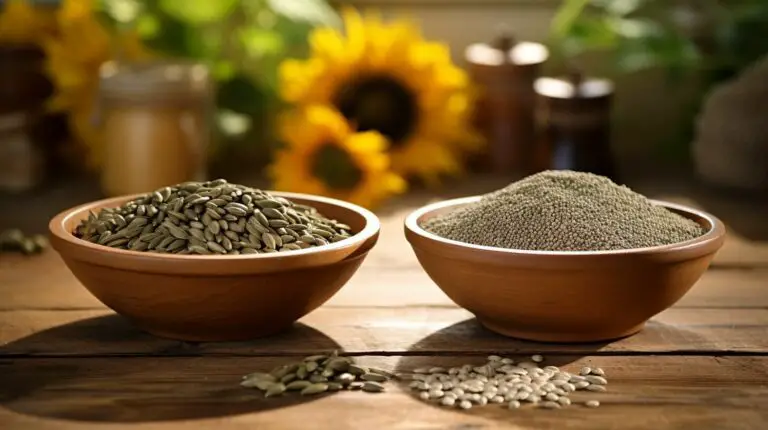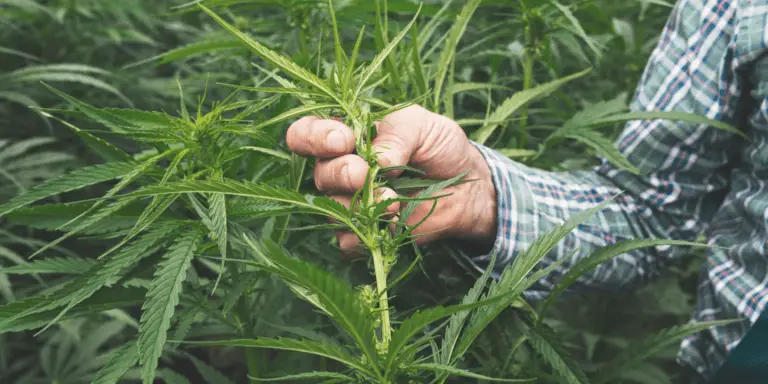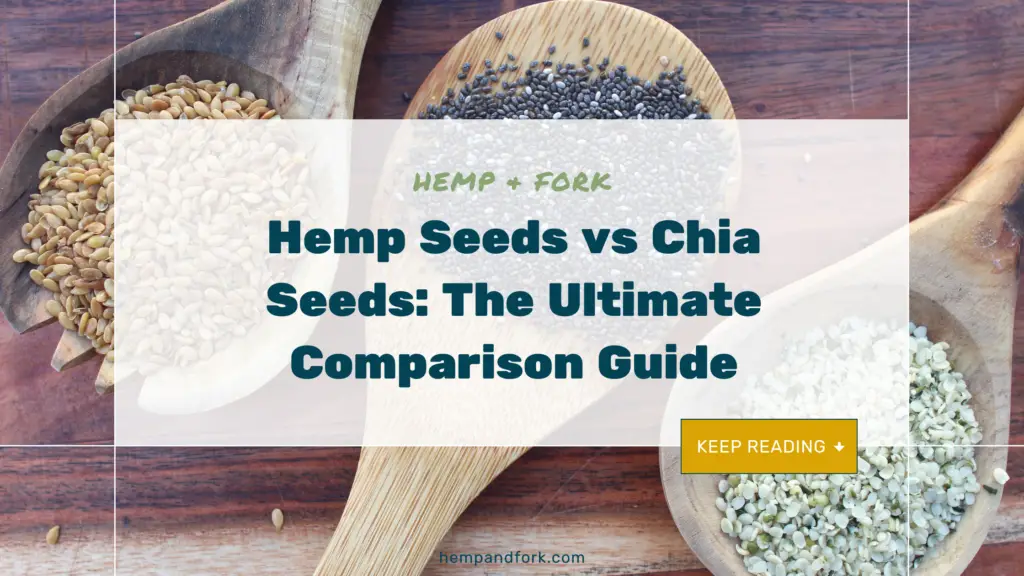
In the realm of superfoods, two seeds have garnered significant attention in recent years: hemp seeds and chia seeds. Both have been lauded for their impressive nutritional profiles and potential health benefits. As they rise in popularity, they’re often pitted against each other in health and nutrition circles, leading many to wonder: Which seed reigns supreme? Let’s dive in and take a look at hemp seed vs chia seed!
Introduction to Hemp Seeds vs Chia Seeds
Navigating the path to peak health often brings us closer to nature, where we unearth the countless benefits of whole, unprocessed foods. Two such natural treasures that have gained immense traction in recent times are hemp seed and chia seed. These seeds, diminutive in size, are bursting with health advantages.
Hemp seed, celebrated for its balanced essential fatty acids, and chia seed, renowned for its hydration properties, have become indispensable in the kitchens of health aficionados globally. Their frequent appearances in smoothies, puddings, and baked delights speak volumes about their escalating popularity. But their appeal isn’t just culinary; these seeds have deep-rooted histories spanning millennia.
Historical Background of Chia Seed and Hemp Seed
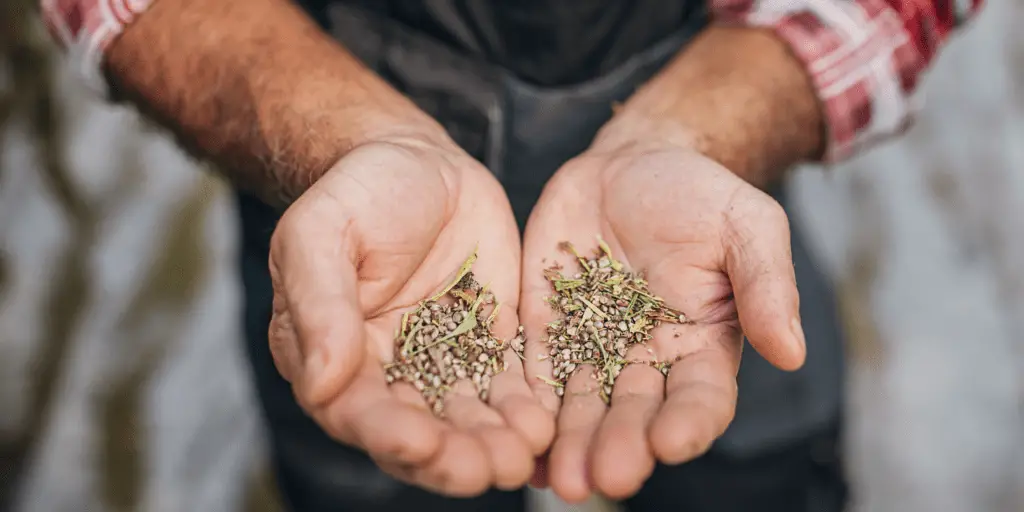
Origins of Hemp Seed
Hemp, belonging to the Cannabis sativa species, boasts a cultivation history exceeding 10,000 years. With roots in Central Asia, it’s among the earliest crops domesticated by humanity. The seeds of the hemp plant, often termed hemp hearts post-hulling, have been integral to various ancient societies.
- Ancient China: Hemp seeds were cherished for their nutritional and medicinal properties.
- Early Europe: Hemp was primarily grown for its fibers, leading to the production of ropes, textiles, and even paper.
- Native American Cultures: Recognized the therapeutic attributes of hemp and seamlessly integrated it into their daily rituals.
Curious to read more about the nuances between Hemp Hearts vs Hemp Seeds. Don’t miss our comprehensive guide!
Origins of Chia Seed
Chia seeds, sourced from the Salvia hispanica plant indigenous to Central America, have a history intertwined with ancient civilizations like the Mayans and Aztecs.
- Ancient Central America: Revered for their energy-boosting properties, chia seeds were a dietary staple.
- Mayan and Aztec Cultures: Used chia seeds not just as food but also as offerings in religious ceremonies.
| Seed | Origin | Primary Historical Use |
|---|---|---|
| Hemp Seed | Cannabis sativa | Textiles, Food |
| Chia Seed | Salvia hispanica | Energy, Religious Offerings |
Both seeds have played pivotal roles in ancient societies, not merely as food but also for their diverse applications, underscoring their multifaceted importance through the ages.
Nutritional Comparison: Hemp Seed vs Chia Seeds
Before diving into the debate, it’s essential to understand the nutritional makeup of these two powerhouse seeds.
Hemp Seed Nutrition
Hemp seeds, often referred to as hemp hearts when shelled, are the seeds of the hemp plant, Cannabis sativa. Despite being from the same species as cannabis (marijuana), they only contain trace amounts of THC, the compound that causes the drug-like effects of marijuana.
| Nutrient | Amount/Percentage |
|---|---|
| Calories | 170 |
| Protein | 10g |
| Fat | 13g (8g Omega-6, 2.5g Omega-3) |
| Fiber | 3g |
| Magnesium | 45% of the RDA |
| Zinc | 21% of the RDA |
Benefits:
- Rich in Essential Fatty Acids: Hemp seeds are a great source of Omega-3 and Omega-6 fatty acids, which are crucial for heart health.
- High-Quality Protein: They contain all nine essential amino acids, making them a complete protein source.
- Digestive Health: The fiber content aids in digestion and promotes gut health.
Chia Seed Nutrition
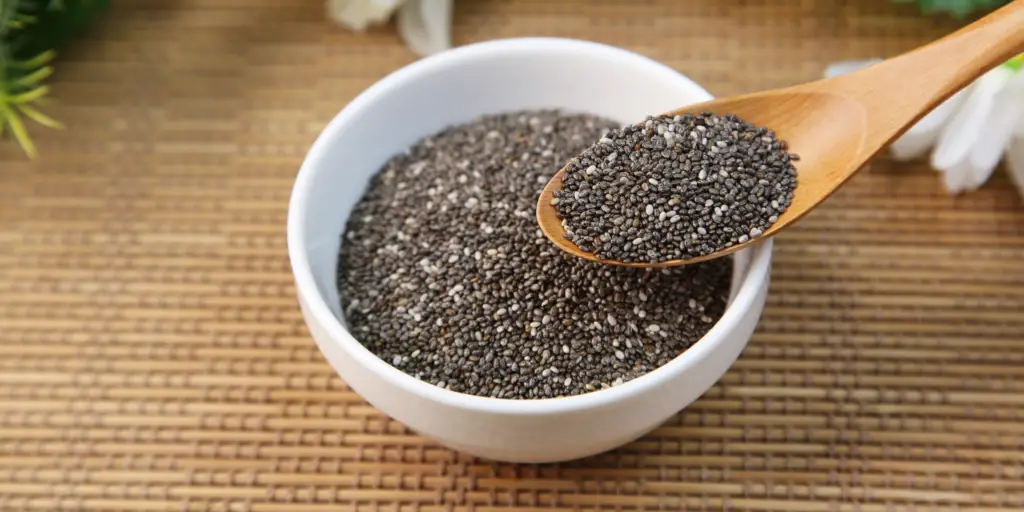
Chia seeds are tiny black seeds from the plant Salvia hispanica, which is related to the mint. They were an essential food for the Aztecs and Mayans and were prized for their ability to provide sustainable energy.
| Nutrient | Amount/Percentage |
|---|---|
| Calories | 138 |
| Protein | 4.7g |
| Fat | 8.6g (with 5.4g of Omega-3) |
| Fiber | 9.8g |
| Calcium | 18% of the RDA |
| Magnesium | 23% of the RDA |
Benefits:
- Loaded with Antioxidants: These help to protect the body against free radicals.
- Bone Health: Chia seeds are rich in calcium, phosphorus, and magnesium, all essential for bone health.
- Regulate Blood Sugar: The high fiber and protein content can help regulate blood sugar levels.
Health Benefits: Hemp Seeds vs Flax
Benefits of Hemp Seed
- Cardiovascular Health: The omega-3 and omega-6 fatty acids in hemp seeds can help reduce cholesterol levels in the blood, thereby reducing the risk of heart diseases.
- Hemp Seed Oil: Apart from being used in cooking, hemp seed oil is often used topically due to its skin health benefits. It can moisturize without clogging pores and can help to balance out oily skin.
- Brain Health: The fatty acids in hemp seeds are essential for brain development and function. They also have anti-inflammatory properties that can help with conditions like depression, anxiety, and even Alzheimer’s disease.
Benefits of Flaxseed
- Digestive Health: The high fiber content in flaxseeds aids in digestion and can help prevent constipation.
- Potential Health Benefits: Some studies suggest that flaxseeds may help reduce the risk of certain types of cancers, especially breast and prostate.
- Flaxseed Oil: Rich in ALA, flaxseed oil can help reduce inflammation, lower heart disease risk, and improve skin health.
The Tiny Powerhouses: Understanding the Nutritional Content
In the realm of superfoods, both chia and hemp seeds reign supreme. These edible seeds, though tiny, are bursting with nutritional goodness that can significantly enhance our daily diets.
Chia Seeds: At a glance, chia seeds contain a remarkable amount of fiber, protein, and omega-3 fatty acids. Specifically, just one tablespoon of chia seeds can provide a substantial portion of your daily fiber needs. They are also high in antioxidants, calcium, and magnesium.
The omega-3 fatty acids in chia seeds are primarily in the form of alpha-linolenic acid (ALA), which has been linked to various health benefits, including supporting heart health. When it comes to recipes, it’s common to use about 10-15 grams of chia seeds, especially in puddings and smoothies, where they absorb liquid and create a gel-like consistency.
Hemp Seeds: Diving into what hemp seeds contain, you’ll find they are a complete protein source, meaning they provide all the essential amino acids our bodies need. In terms of omega-3 fatty acids, hemp seeds offer a balanced ratio of omega-6, which is believed to be optimal for human health.
Beyond protein and fatty acids, hemp seeds are also rich in vitamin E, phosphorus, potassium, and more. They have a mild, nutty flavor, making them a versatile addition to dishes. Typically, recipes might call for 2-3 tablespoons of hemp seeds, which equates to about 20-30 grams, to sprinkle on salads, blend into smoothies, or mix into oatmeal.
The significance of omega-3 fatty acids cannot be overstated. They play a crucial role in brain health, reducing inflammation, and promoting heart health. Both chia and hemp seeds offer these fatty acids, making them essential additions for those seeking to boost their omega-3 intake.
Additionally, the protein content in these seeds, especially in hemp seeds, is noteworthy. They can be a great protein source, particularly for those following plant-based diets.
Uses in Culinary Arts
Hemp Seeds
Hemp seeds, with their nutty flavor and soft texture, have become a favorite addition to many dishes. Here are some popular ways to incorporate them into meals:
- Smoothies: Blend hemp seeds with fruits, vegetables, and a liquid base for a protein-packed drink.
- Salads: Sprinkle shelled hemp seeds on top of salads for added crunch and nutrition.
- Hemp Seed Butter: Process hemp seeds in a blender until they turn into a buttery consistency. Use it as a spread or in recipes as a nut butter substitute.
- Baking: Add hemp seeds to bread, muffins, and cookies for a nutritional boost.
- Hemp Seed Milk: Blend hemp seeds with water and strain to create a dairy-free milk alternative.
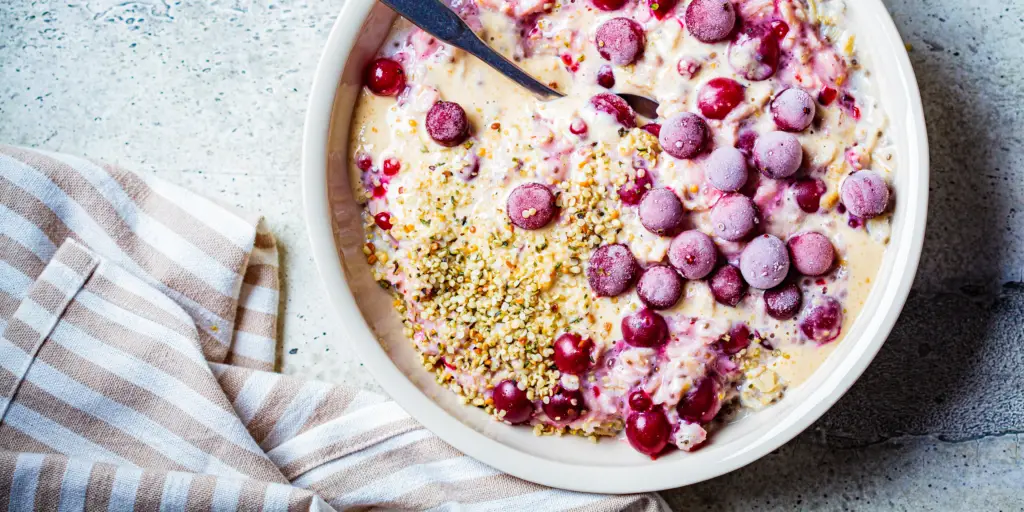
Chia Seeds
Chia seeds are incredibly versatile in the kitchen, thanks to their ability to absorb liquid and form a gel-like consistency. Here’s how they’re commonly used:
- Chia Pudding: Mix chia seeds with milk (or a dairy-free alternative) and let them sit overnight. The result is a creamy pudding that can be flavored with fruits, nuts, and sweeteners.
- Smoothies: Just like hemp seeds, chia seeds can be added to smoothies for added fiber and protein.
- Baking: Incorporate chia seeds into bread, pancakes, and other baked goods.
- Chia Gel: Combine chia seeds with water to create a gel that can be used as an egg substitute in vegan recipes.
- Toppings: Sprinkle chia seeds on yogurt, oatmeal, or cereal for added texture and nutrition.
Looking for more ways to incorporate hemp into your diet? Check out our comprehensive guide on how to cook with hemp hearts.
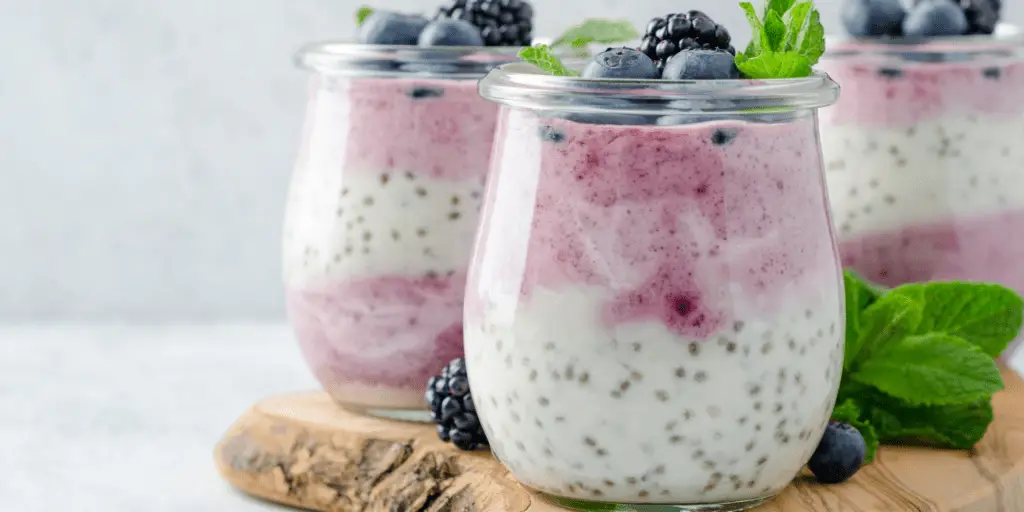
Health Benefits: Chia Seeds vs Hemp Seeds
Health Benefits of Hemp Seeds
Hemp seeds are more than just a culinary delight; they’re a nutritional powerhouse. Here are their primary health benefits:
- Heart Health: The Omega-3 and Omega-6 fatty acids in hemp seeds promote cardiovascular health.
- Skin Health: Hemp seeds can alleviate dry skin and reduce inflammation, making them beneficial for skin disorders like eczema.
- Digestive Health: The fiber in hemp seeds aids in digestion and can help prevent constipation.
🧐 Looking to learn more about the benefits of hemp? Don’t miss our article on the 13 amazing benefits of hemp hearts.
Considerations:
- While hemp seeds are generally safe for most people, those with allergies to hemp should avoid them.
- Hemp seeds may interact with anticoagulant medications, so it’s essential to consult with a healthcare professional if you’re on such drugs.
Health Benefits of Chia Seeds
Chia seeds have been consumed for centuries and are known for their myriad health benefits:
- Weight Management: The fiber in chia seeds can help you feel full longer, potentially aiding in weight management.
- Bone Health: Chia seeds are rich in calcium, which is vital for maintaining healthy bones and teeth.
- Blood Sugar Regulation: They can slow down digestion, which helps stabilize blood sugar levels after meals.
Considerations:
- Consuming too many chia seeds can lead to digestive issues due to their high fiber content. It’s essential to drink plenty of water when consuming them.
- Those on blood pressure medications should consult with a doctor before adding a significant amount of chia seeds to their diet, as chia can lower blood pressure.
Practical Tips for Incorporation in Diet
When it comes to incorporating these super seeds into your diet, quality, and storage are crucial. Here are some practical tips:
Choosing Quality Seeds:
- Hemp and Chia: Opt for organic, non-GMO seeds. They should be free from any additives or preservatives.
- Flax: Choose whole flax seeds over pre-ground, as they retain their nutritional value longer.
Storage and Shelf Life:
- Store seeds in a cool, dark place. Refrigeration can extend their shelf life.
- Hemp seeds can last up to a year if stored correctly, while chia and flax seeds can last several months.
Creative Incorporation:
- Morning Boost: Add seeds to your morning oatmeal or yogurt for a nutritional boost.
- Baking: Mix them into bread, muffins, or cookies.
- Dressings and Sauces: Ground flax or hemp seeds can thicken dressings and sauces.
- Snacking: Make energy balls or bars using a combination of seeds, nuts, and dried fruits.
Chia Seeds and Hemp Seeds in Comparison to Flax Seeds
Flax seeds have been a staple in health-conscious diets for many years, even before hemp and chia seeds rose to prominence. These tiny, brown or golden seeds come from the Linum usitatissimum plant and have been consumed for over 6,000 years.
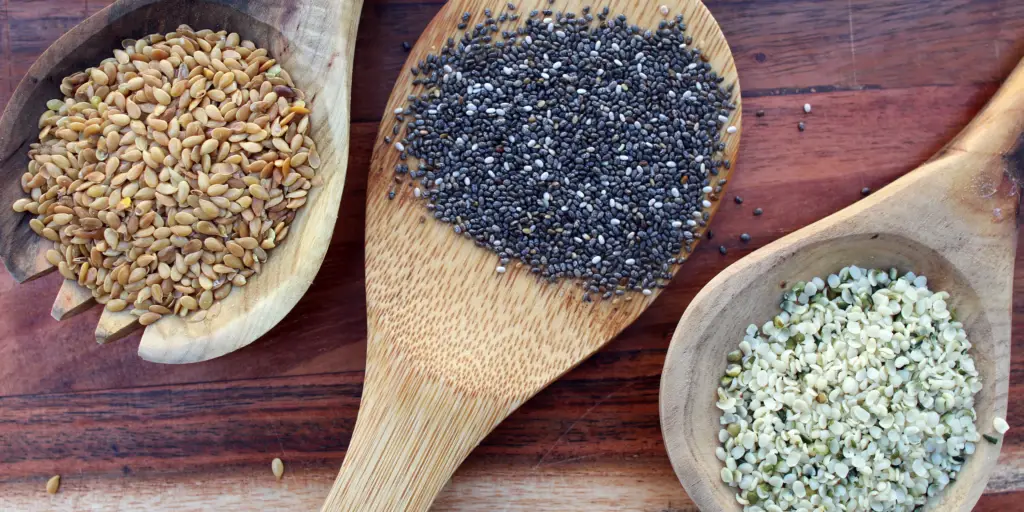
| Nutrient | Amount/Percentage |
|---|---|
| Calories | 110 |
| Protein | 4g |
| Fat | 8.5g (with 6.5g of Omega-3) |
| Fiber | 5.6g |
| Magnesium | 15% of the RDA |
| Calcium | 4% of the RDA |
Comparison:
- Nutrition: While hemp seeds are higher in overall protein, flax seeds lead in Omega-3 content. Chia seeds, on the other hand, are a fiber powerhouse.
- Health Benefits: All three seeds promote heart health due to their Omega-3 content. However, flax seeds also contain lignans, which have antioxidant properties.
- Culinary Uses: Flax seeds can be used similarly to chia and hemp seeds. They can be added to smoothies, baked goods, and salads. Ground flax seeds can also be used as an egg substitute in vegan recipes.
Discover the nutritional showdown between Hemp Seed vs Flax Seed. Dive into our comprehensive guide to understand the unique health benefits of both seeds and make an informed choice for your diet.
FAQ
Conclusion
Navigating the intricate world of hemp seeds and chia seeds has been a revelation. These seeds, with their illustrious histories and unparalleled nutritional profiles, transcend fleeting health trends. They’re nature’s nutrient-packed gifts. Each seed offers unique benefits, and the trick lies in discerning what aligns best with your body and dietary needs. Whether you’re team hemp, team chia, or even team flax, the potency of these superseeds is undeniable. Embrace them, experiment with them, and let them fortify you from within. Integrate these seeds into your diet today!
